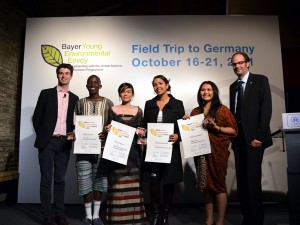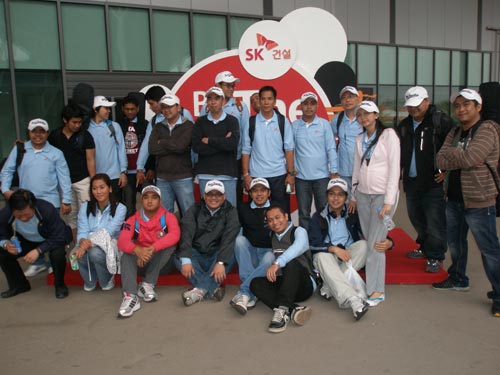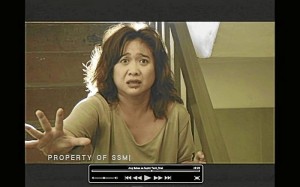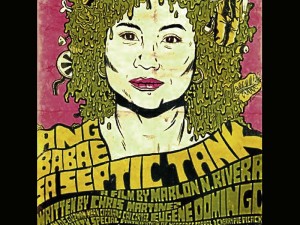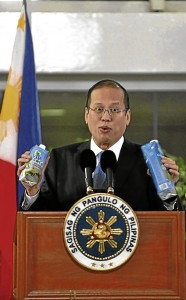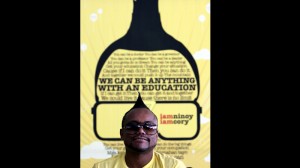 |
| Michelle Leonardo with Gareth Evan, chancellor of the Australian National University |
CANBERRA, Australia-- When Michelle Leonardo graduated with a Master of Diplomacy at the Asia-Pacific College of Diplomacy (APCD) of the Australian National University (ANU). She was pleasantly surprised to receive the James Ingram Prize for Excellence in Diplomatic Studies for foreign students. It was unannounced and took place at the smaller APCD get-together after the formal graduation ceremonies attended by hundreds of graduates at the Llewellyn Hall at ANU’s School of Music.
Leonardo is not new to receiving awards. She came to Australia on a scholarship grant under the Australia Leadership Awards (ALA) program of the Australian Agency for International Development (AusAID) in 2009, which includes full tuition, stipend, and as an ALA scholar, a series of leadership training, coaching and work placement in Australia.
Diplomacy was also not her first postgraduate degree. It was only after finishing her Graduate Diploma and Master degrees in Environmental Management and Development at the Crawford School of Economics and Government – where she also received the Elspeth Young Prize for Social Contribution to Environmental Management and Development in 2010 – that Leonardo decided to apply for a scholarship extension of another six months to take the Master in Diplomacy program She also holds a Bachelor of Arts in Development Studies from the Ateneo de Manila University in 2005 and a Certificate in Project Planning, Development and Management from the Asian Institute of Management in the Philippines.
Student life in Canberra
In her last attendance to a meeting of the Philippine Studies Group, a forum of academics, students, other Filipino community members and friends at ANU, Leonardo was asked to give a short message to current and incoming ANU Filipino students.
Leonardo said simply that one does not need to work hard to prove one's self in the international student community, but at the same time, she tried to enjoy every single day of her stay in Australia. She emphasized the importance of creating and maintaining genuine relationships with other students, as they help each other attain their academic goals.
During her two-and-a-half year's stay at ANU, Leonardo was also an intern at ANUgreen, the university’s environmental management office. At the office, she conducted a preliminary assessment of the options available for a carbon offset scheme at the university.
She was also an academic tutor at the Tjabal Indigenous Higher Education Centre, where she assisted Aboriginal and Torres Straits Islanders. Yet, she also found time to be a facilitator several times for pre-departure training of AusAID’s Australian Youth Ambassadors for Development (AYAD) program.
Feminization of diplomacy
Professor William Maley, APCD director, announced two female winners of this year’s James Ingram Awards, Leonardo and Australian student Kate McCallum. Both women received special awards for obtaining the highest grades for this year’s batch of students
Prof. Maley said having two women awardees may signal the “feminization of diplomacy.”
Women, indeed, have become one of the leading figures in world diplomacy with US Secretary of State Hillary Clinton and her predecessors Condoleeza Rice and Madeline Albright. In Australia, the head of state and head of government are women, Governor-General Quintin Bryce and Prime Minister Julia Gillard, respectively.
Over the last two decades, the Philippines had two female heads of state: President Corazon C. Aquino and Gloria M. Arroyo who decided the foreign policy directions of the Philippines. In the area of protection of Filipino overseas workers, it was Aquino who started referring to them as “heroes.” She also started the first Filipino Resource Workers Center in Singapore.
On the other hand, Arroyo was the first to articulate the third pillar of foreign policy of promoting the protection of OFWs in her State of the Nation Address and in deciding to pull out a small contingent of Filipino troops from Afghanistan to save the life of kidnapped victim Angelo dela Cruz.
Female diplomats occupy high positions in the Philippine foreign service. Under the presidency of Benigno Aquino III, the foreign service career corps had a special boost when he named the most number of career foreign service officers to head Philippine Embassies overseas, many of them women.
In the 2009 Foreign Service Officers’ (FSO) examination, 7 women out of 20 passed the four-part exams, which includes a pre-qualifying test, a preliminary interview, a 3-day written examination, and a 3-day oral examination. The FSO exams are considered the most difficult qualifying exams in the Philippines.
Over the past decade, the number of female FSOs have increased despite diplomacy’s reputation as a “boy’s club”, and even more women hold the ranks of foreign service staff officers and foreign service staff employees in the Department of Foreign Affairs.
Currently, 26 out of 64 Philippine Embassies are led by female Ambassadors while 8 out of 21 Consulates-General are headed by women Consul Generals. Among the embassies headed by women diplomats as Ambassadors or as Charge d’Affaires, ad interim, are those in Australia, Austria, Bahrain, Brazil, Canada, Chile, Finland, Germany, Hungary, Indonesia, Israel, Laos, Myanmar, Norway, Portugal, Romania, Singapore, Sweden, East Timor, Thailand, Turkey, United Arab Emirates, Vatican, and Venezuela. Meanwhile, Consulates-General headed by women diplomats include Sydney, Chongqing, Osaka, Los Angeles, Frankfurt, and Milan.
In Australia, women diplomats lead the Philippine Embassy in Canberra and Consulate-General in Sydney, namely by Charge d’Affaires Mary Anne Padua and Consul-General Anne Louis, respectively. Amb. Belen Anota, who served in Israel and Singapore as Ambassador, has been appointed by President Aquino as Ambassador to Australia.
There are many career Filipina diplomats who have reached the apex of their careers in foreign service, such as Senator Leticia Ramos-Shahani, Secretary Delia Albert, Ambassador Rosario Manalo, Undersecretary Erlinda Basilio, Ambassador Sonia Brady, Ambassador Susan Castrence and Ambassador Delia Rosal.
Diplomatic training in Australia
ANU’s Asia Pacific College of Diplomacy (APCD) was established in 2003. The first of its kind in the southern hemisphere, it aims to promote high-level education, research and dialogue with respect to transnational diplomacy in the Asia-Pacific region.
Since the beginning of its Masters degree program, six Filipinos have graduated from the APCD through the Australia Leadership Awards (ALA) includes Leonardo.
Juan E. Dayang, Jr. is one of two Filipino diplomats who are doing postgraduate studies at ANU on Australian government scholarship grants. He is doing a 2-year doctorate in Diplomatic Studies at APCD 